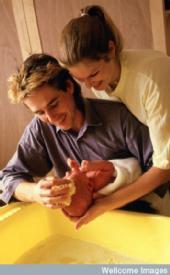Research blog - February
'Advising Fathers-To-Be'
February 2012

The internet has quite radically changed our approach to information – google can now lead us to information or advice on nearly any topic we could possibly want to know about. “Advice for fathers”, for example, generates around 37 million results. Of course, the desire to know more about pregnancy, childbirth and the care of infants is not new – for centuries, books and pamphlets have been produced to reassure, teach and support parents. The genre of literature aimed specifically at Dad is newer, but even books from the nineteenth century assumed he was reading – when addressing the ‘parent’, most writers believed they were talking to men.
Now the tone is very different – authors of advice texts for men seek to reassure men that they are important, and can be a helpful source of support for their partners. Since the 1970s, books for fathers have reminded them that they are in fact useful. In 1977, for example, Peter Mayle, in his book How to be a pregnant father, told dads that traditionally this was a point at which he ‘becomes a rather uneasy background figure, hovering on the fringes of this great event’. Little attention has been paid to men’s experience of pregnancy, the reader is told, and ‘most definitely, there is a man’s role’. Peter Little, in a book of 1980 entitled The Baby Book for Dads, suggests to the father reading that ‘your help will be invaluable if only by being there’. A constant reiteration that fathers are, in fact, important remains today; in the Fatherhood Institute’s Guide for New Dads given out to men by hospitals after birth, fathers are immediately reminded that they have a ‘vital role’ in helping their child achieve happiness and wellbeing.
The common thread of all this literature is the repeated suggestion that dads are important. Is this about appealing to men – by reasserting fathers’ importance, the reader will be more attracted to the messages put forward? Or does this tell us that fathers today still think they are less important than mothers? Do we just need to move beyond the assumption that men are inferior parents? After all, there’s still a lot of stereotyping of men as useless parents – Channel 4’s Daddy Daycare this week didn’t help matters, for example. Perhaps we simply need to start celebrating the positive parental figures in children’s lives – whether they’re biological parents, adoptive parents, grandparents, male, female, straight, gay or bisexual. It’s about the individual parent – their skills, their patience, their love for the child – not their gender.
What do you think? Were parenting advice manuals helpful for you? Dads – did you feel reassured by books aimed specifically at men, or do you prefer literature that gives general, practical advice to anyone reading? Let me know below…
